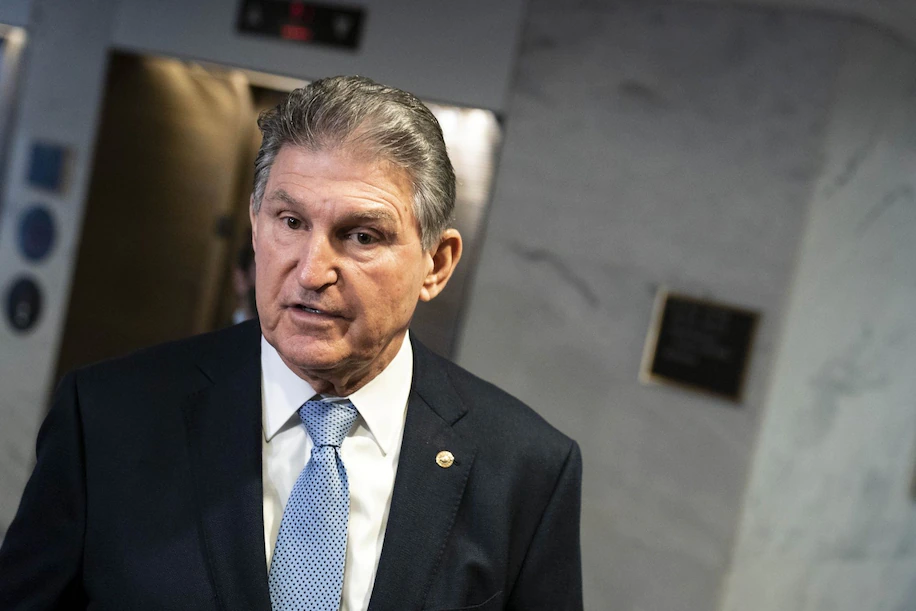The hidden, ugly truth behind Joe Manchin’s stance on BBB’s climate provisions
Sen. Joe Manchin III (D-W.Va.) on Capitol Hill in D.C. on Dec. 13. (Sarah Silbiger/Bloomberg)
What’s really driving Sen. Joe Manchin III’s opposition to the Build Back Better package?
by Greg Sargent
We know the West Virginia Democrat is exaggerating the threat from inflation and has relied on bogus numbers to inflate BBB’s deficit impact. We know he reportedly thinks the expanded child tax credit could create a class of welfare moochers when it would be empowering for millions.
All that reminds us that the Democratic agenda is largely at the mercy of one man who is relying on terribly wrongheaded policy arguments and priorities.
But our planetary future is also to some degree at the mercy of that same one man. The precise nature of Manchin’s stance on BBB’s climate provisions is difficult to pin down, but two new developments help illuminate it.
First, the United Mine Workers of America just called on Manchin to reconsider his opposition to BBB. Second, the New York Times just published an expose of the coal industry’s apparent success in shaping Manchin’s stances.
Why do the mine workers want Manchin to support BBB? I talked to Phil Smith, the union’s chief lobbyist. The short answer: Some of its provisions provide a better chance of helping workers who will be dislocated by our transition to a decarbonized future — a dislocation that will likely continue either way — than not passing BBB will.
This notion undermines Manchin’s posture. His most fundamental argument on BBB’s climate agenda is that it will transition us to decarbonization too quickly, threatening extensive collateral damage.
But, given the miners’ belief that BBB is needed to mitigate this transition, this raises questions about whose interests Manchin, in making that argument, is really representing.
The Times piece reports that coal interests have heavily lobbied Manchin throughout BBB negotiations. Manchin himself personally profits off industry holdings, per the Times.
In his statement announcing opposition, Manchin made specific claims about its climate provisions. None hold up under scrutiny, but they appear to reflect arguments coming from the industry.
For instance, Manchin argues BBB will threaten the “reliability of our electric grid,” because BBB will transition us too fast, leading to consequences that “we have seen in both Texas and California.”
Here Manchin is referring to BBB’s hundreds of billions of dollars in tax incentives for manufacturers and purchasers of power generated by alternative sources such as wind and solar. But as the Times reports, Manchin is echoing what coal industry lobbyists argue.
That claim is that subsidizing renewable energy will jeopardize the electric grid by leading to the retirement of coal and natural gas plants too quickly. Translation: It’s bad for business.
But the blackouts in Texas and California resulted from other causes, such as lack of extreme weather preparation. And scientists are loudly warning that the threat of climate change catastrophe demands faster action, not slower.
Manchin also argues that BBB’s tax incentives will “increase our dependence on foreign supply chains.” As the Times suggests, that echoes the coal industry’s argument that a subsidized expansion of U.S. solar power could benefit China, given its dominance of the supply chain in solar components.
So Manchin seems to be trading on fears of China to discourage investments in renewable energy. And here is where the position of the miners union gets interesting.
As Smith of the miners union told me, the union wants BBB precisely because it opens up more possibilities for displaced coal workers to find work in the renewable energy sector.
Here’s why. In addition to incentives for alternative energy manufacturing, BBB also contains provisions that incentivize companies to do this manufacturing in “coal-producing areas of the country,” as Smith put it.
The core idea here is that fossil fuel jobs will keep declining because of all kinds of causes, even as the transition to alternative energy continues. If so, Smith says, more investment in alternative sources, when combined with incentives encouraging their manufacture in those areas, will give displaced workers a better shot at a stake in this transition.
“This provides the potential for good jobs that our members who have been dislocated can get,” Smith told me. He noted that some 45,000 coal mining jobs have been lost since 2012, adding that the goal is to recapture alternative energy supply chains for U.S. workers.
What’s strange is that Manchin has supported such subsidies. He co-sponsored a bill with Sen. Debbie Stabenow (D-Mich.) that would create tax credits for manufacturers to build equipment for alternative energy industries in places where coal mines have closed or plants have been retired.
Yet even if Manchin does still support that goal, he is now objecting to BBB’s overall climate provisions. Manchin already succeeded in killing another key piece of BBB’s climate proposals — the provision that would punish fossil fuel companies for not transitioning fast enough — yet he’s now objecting to even the subsidies encouraging this transition.
“We’re likely to lose coal jobs whether or not this bill passes,” Smith told me. “If that’s the case, let’s figure out a way to provide as many jobs as possible for those who are going to lose.” Smith added that BBB tax incentives provide a “pathway to do that.”
Manchin has supported this idea in the past, but now he’s making it less likely to occur, and echoing coal industry rhetoric while killing BBB. Whose interests is he really representing here?

